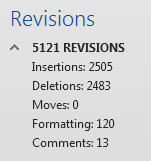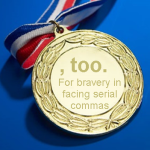We’re getting toward the end of the draft on LINESMAN book 2. I’m rewriting an action scene, Sherylyn’s finding and deleting unnecessary words. Right now, she’s checking ‘too’ and ‘but’.
When I look at the word count, the manuscript is four hundred words less than it was when we started. And I’m adding words.
That’s four hundred unnecessary toos and buts in a 100,000 word manuscript. (125,000 words actually, but let’s not go there. The novel should be shorter.)
I’ve said before that our writing doesn’t gradually improve over time. It improves slowly for a while, then levels out, or even goes down—sometimes quite a long way down—and then works its way back up to its old skill level.
We’re too close to say if our writing has improved over the last twelve months, but the way we write together certainly has changed. That’s due to two things.
Contract deadlines
The first thing that has changed for us is contract deadlines.
We no longer have the luxury of writing when we want, how we want. We have to deliver on an agreed date. We know we need multiple drafts of our work. We work back from there.
We can no longer wait for one of us to finish something before the other looks at it.
The cloud
The second thing that has changed is that we subscribed to Microsoft’s Office 365, which came with a subscription to Microsoft’s One Drive. Nowadays, rather than one of us work on their hard drive, then hand the completed file over to the other to put onto their hard drive, and so on, we both work on the same file in the cloud. Usually at the same time.
This has led to some fraught times. Microsoft hasn’t got their syncing perfect yet—especially not when you’re running four PCs, two of which are plugged into the cloud while you’re using them, but the other two of which are only connected at night, when you get home from work. Which is why you’ll occasionally find an anguished blog about Microsoft’s latest ‘feature’. But it works well enough that it’s how we edit now.
So how do you work now?
First up we do a lot more planning and talking about the story outside of writing it.
We’re still pantsers, but we often talk upcoming plot points through just before we write them. We don’t do this too far in advance mind. It’s on the day of writing, or the day before. It cuts time when you’re stuck, or when you know a character wouldn’t do a particular thing that you want them to do and you want your co-writer to agree with you that they can do it. (Co-writer usually says, “Nope, not going to happen,” but you work through it and come up with a better solution.)
And of course, characters still don’t always do what you’ve planned for them.
Next up, we don’t wait for one writer to be finished before the other starts editing. If, say, I’ve finished a chapter and am working on the next scene, Sherylyn moves in behind me picking up the logic flaws, updating the scene I’ve just finished, picking up the typos she can see and making comments.
We do this in the same document.
A lot of things haven’t changed. We still write an ordinary first draft we’d be horrified to show to anyone. Second and third drafts are still major rewrites. We still read the document aloud to clean it up.
But we’re working faster than we used to. And we’re working better as a team.



